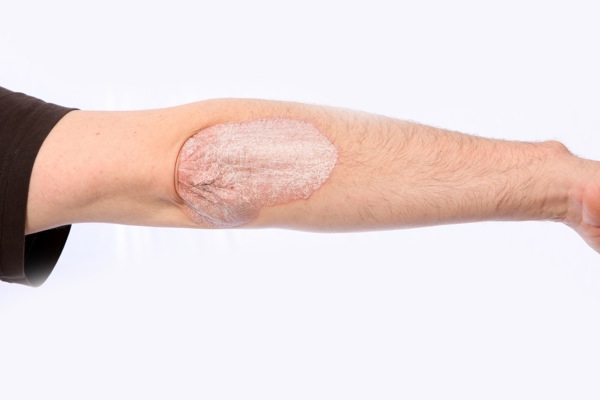Difference between psoriasis and eczema
Causes, Symptoms, and Diagnosis

Difference between psoriasis and eczema
Understanding
skin disease can often be complex, with medical terms and differing symptoms
making it difficult to distinguish between conditions. This is
particularly the case when trying to identify the difference between psoriasis
and eczema, two commonly confused conditions. To better grasp these diseases, let’s take a
detailed look at the diagnosis, characteristics, causes, and appropriate
remedies.
Its Characteristics, Development, and Common Types
Psoriasis is a chronic autoimmune condition that accelerates the speed of skin cell growth, causing cells to pile up on the skin's surface. The trademark signs of psoriasis often manifest as thick, inflamed patches of red skin covered in silvery scales, usually appearing on the elbows, knees, scalp, or lower back. It can also affect nails and joints.
Eczema, on the other hand, refers to a group of conditions that lead to inflammation and irritation of the skin. The most common type of eczema is atopic dermatitis, characterized by itchy, red, and dry skin caused by inflammation. Unlike psoriasis, eczema often presents in specific areas depending on the age of the individual and can have a strong correlation with allergic conditions.
Treatment Approaches for Psoriasis and Eczema
The symptoms of these two skin diseases may appear similar, but their causes and triggers differ significantly. The primary difference rests in their underlying causes. Psoriasis is an autoimmune disease – a result of an overactive immune system that causes inflammation in the body. This inflammation causes the rapid overproduction of skin cells that gives rise to psoriasis patches.
The Role of Natural Remedies in Managing Psoriasis and Eczema
The causes of eczema are slightly different. Many factors can lead to the development of eczema, such as genetics, where a person inherits a particular gene that makes them more prone to the condition. Other causes include environmental factors like irritants, allergens, stress, and climate. Atopic dermatitis, the most common form of eczema, also has strong ties to allergies and asthma.
Personal Variations in Symptoms and the Importance of Medical Advice
The treatments for psoriasis and eczema differ, primarily due to their distinct triggers and symptoms. Psoriasis treatments include topical treatments, systemic medications, and light therapy. Systemic treatments, such as biologics, can help to reduce inflammation and slow skin cell growth by targeting the immune system.
Difference between psoriasis and eczema
Understand Why the Dead Sea is Beneficial for Psoriasis
Identifying and Managing Triggers for Psoriasis and Eczema
Unlike psoriasis, eczema management often focuses on preventing itchiness, inflammation, and worsening of the condition. Skin creams, lotions, and ointments to moisturize the skin, alongside medications to reduce inflammation, are commonly recommended. Avoiding certain allergens and irritants, and adopting daily bathing and moisturizing habits, can also help manage eczema.
The Impact of Emotional Well-being on Skin Conditions
While medication is usually the first line of treatment, many individuals also seek natural help for psoriasis and eczema. For psoriasis, certain dietary changes, sunlight exposure, and saltwater baths have shown to bring some relief. Meanwhile, the use of essential oils, such as tea tree, lavender, or chamomile, can help manage eczema symptoms.
Living with Psoriasis and Eczema: Challenges and Coping Strategies
It is important to note that the severity and type of symptoms of both psoriasis and eczema can vary greatly from person to person. It is always recommended to seek a healthcare provider's advice to ensure the correct diagnosis and treatment.
The Role of Support Groups and Education in Managing Stigmatization
A key element in managing both psoriasis and eczema is understanding the triggers. For some, certain foods, stress, or weather changes may exacerbate symptoms. Being aware of these triggers can play an essential role in managing these skin conditions effectively.
The Importance of Consulting Dermatologists for Treatment Options
Also, emotional well-being often plays a significant role in the severity of these conditions. Both psoriasis and eczema have been linked to stress, and stress relieving activities like meditation and yoga can help manage symptoms.
Managing Chronic Skin Conditions: A Journey towards Comfort and Fulfillment
Living with psoriasis or eczema is undoubtedly challenging, especially given the discomfort and visible nature of both diseases. However, with the right support and management, many people with these conditions lead fulfilling lives with minimal disruptions.
There is currently no cure for either psoriasis or eczema. However, treatments can manage symptoms and prevent flare-ups. It's important to remember that medications and natural treatments affect everyone differently, so it may take some time to find the most effective regimen.
Support groups can also be an invaluable resource for those living with psoriasis or eczema. Furthermore, educating family and peers about the diseases can help reduce stigma and misconceptions.
While the comparison drawn in this article provides a basic understanding of the difference between psoriasis and eczema, each person's experience is unique. Care should be taken to consult with a healthcare provider for accurate information and treatment options based on personal health history.
People often turn to dermatologists, physicians who specialize in the diagnosis and treatment of skin diseases, for advice and treatment options for psoriasis and eczema. These professionals have the expertise to make an accurate diagnosis and create an appropriate treatment plan.
Psoriasis and eczema are chronic conditions that require ongoing management. Nonetheless, with a deeper understanding, appropriate remedies, professional advice, and the support of loved ones, coping with these conditions becomes more manageable.
Conclusion: The Crucial Differences between Psoriasis and Eczema
In conclusion, while psoriasis and eczema may share some common symptoms, their causes and treatments are distinct, thus necessitating different approaches in management. With appropriate care and awareness, these skin conditions can be successfully managed, allowing individuals to lead comfortable and fulfilling lives.




